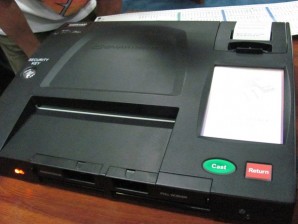Comelec exec on poll preparation: ‘We’re right on track’

Precinct count optical scan (PCOS) machine. MATIKAS SANTOS/INQUIRER.net
MANILA, Philippines — The Commission on Elections on Tuesday briefed members of the House committee on suffrage and electoral reforms about its preparations for the midterm polls.
During the hearing, lawyer Jose Tolentino, Comelec executive director, told legislators that deployment of the precinct count optical scan (PCOS) machines would start on March 1 up to May 8, in time for Election Day on May 13.
Final testing will be from May 6 to 10 and will be done in the schools, he said.
“We started configuring the PCOS machine yesterday (Monday) and will start printing official ballots by February 4. We are right on track,” he told the panel.
Comelec is also preparing for mock elections, he said, detailing that some 700 real registered voters will participate in mock balloting in the National Capital Region.
Random manual audits will follow the mock polls in the evening, he said.
Aside from updating legislators on their preparations for the polls, the Comelec also had to answer lawmakers’ questions on contingency measures just in case they were needed.
Tolentino said that they sought to make the voting process continuous in case a PCOS machine cannot transmit its voting data through local telcos or satellite by “physically delivering the data to the board of canvassers.”
He said that CF cards containing election data would be placed and sealed inside envelopes which will be brought to the board of canvassers.
“That will only be done kung hindi talaga maka-transmit (if it’s impossible to transmit), we can bring the CF cards to other schools, precincts,” he said.
Cesar Flores, president of Smartmatic Asia-Pacific, assured the panel that PCOS machines were “generic… In theory, you can take a CF card and transmit (its data) from another PCOS machine.”
He said that tampering the CF card’s content will make it invalid and can “shut down a PCOS machine.”
Flores said that safety was what the Comelec had to address in terms of delivering data to another precinct as “people might attempt to steal or destroy it.”
He added that the Comelec had several thousand spare PCOS machines which it could deploy to various areas in case the ones being used broke down.
“The scenario is that if it doesn’t work from the start, you wait for the spare PCOS. If it breaks in the middle of the day, you can wait for the spare or get the ballots to be fed later to the machine. The possibilities are always either to wait for spares but also to go next door (to process the votes),” he said.
What will not be happening in the midterm polls was manual counting, said Tolentino.































